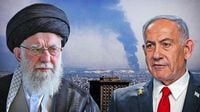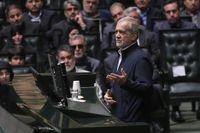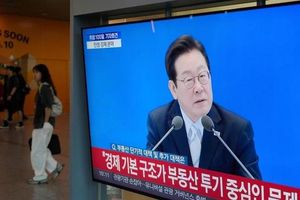On August 18, 2025, the already tense relationship between Iran and Israel took another ominous turn, as Iran’s top military adviser to Supreme Leader Ali Khamenei warned that a new war could erupt "at any moment." The stark statement from Major General Seyed Yahya Rahim Safavi, echoed by other senior Iranian officials, comes just months after a deadly 12-day confrontation in June left hundreds dead and thousands wounded on both sides. The warning has sent ripples through the region, highlighting both the fragility of the current ceasefire and the broader instability gripping Iran itself.
Safavi’s remarks, delivered in a video statement first reported by Iran Front Page News and widely circulated in Iranian media, left little room for ambiguity. "We are not in a cease-fire. We are in a stage of war. At any moment the situation may collapse, as there is no protocol, agreement, or treaty between us and the U.S. and Israel," Safavi declared. He doubled down on the need for military vigilance, adding, "A new war between Iran and Israel may occur at any time. We must adopt an offensive strategy; the best defense is an attack." According to Newsweek, Safavi further emphasized, "We must be prepared for the worst-case scenario. There is no protocol between us and Israel and the U.S. There is no cease-fire. A new war with Israel could break out at any moment. We must be strong and prepared."
His comments reflect deep anxiety within Iran’s leadership about the possibility of renewed hostilities. They also underscore a significant divergence of opinion at the highest levels of Iranian government. While Safavi and military commander Amir Hatami have stressed the need for readiness and even preemptive action, Foreign Minister Abbas Araghchi has offered a more measured assessment. "As an international relations expert, I am not of the opinion that war will happen in the near future," Araghchi told state television, though he too insisted on the importance of preparation. "Everything can resume. They can resume; we can resume. There is no official cease-fire, and everything is possible, and it is not just Iran that should be worried and concerned."
The June conflict, which erupted on June 13, was one of the deadliest in recent memory between the two rivals. According to the Iranian Health Ministry, 606 civilians were killed and 5,332 wounded as Israeli strikes targeted Iranian nuclear facilities and senior military command centers. Israeli officials reported 31 deaths and about 3,000 injuries from Iranian retaliatory attacks. The United States, acting in coordination with Israel, joined the conflict on June 22 with strikes on Iranian nuclear sites at Natanz, Fordow, and Isfahan. Iran responded by launching missiles at the U.S. Al-Udeid Air Base in Qatar. The fighting only subsided after then-President Donald Trump declared a ceasefire on June 24, but as Safavi’s recent comments make clear, the truce remains more notional than real.
Adding to the combustible mix are Iran’s worsening domestic woes. The country is currently grappling with severe water and electricity shortages, the result of five consecutive years of drought, mismanagement, underinvestment, and the impact of international sanctions. Hydroelectric plants are failing to meet demand, forcing the government to impose two-hour power cuts in major cities twice a day. While authorities have blamed crypto-mining operations for the excessive energy use, multiple sources—including The New York Sun—report that Iran’s uranium enrichment facilities have diverted vast amounts of water from the nation’s rivers, further exacerbating the crisis.
The dire situation has sparked growing public anger and resentment toward the government. President Masoud Pezeshkian, addressing parliament, described the water crisis as "serious and unimaginable," lamenting, "We do not have water, we do not have water under our feet and we do not have water behind our dams, so you tell me what do we do? Someone comes and tells me what do I have to do?" The crisis has also become a point of international contention. Last week, Israeli Prime Minister Benjamin Netanyahu offered to help Iran with water supplies—contingent, he said, on the Iranian people being "free" of the Islamic regime. Pezeshkian scoffed at the gesture, calling it "a MIRAGE, NOTHING MORE," and accusing Netanyahu of hypocrisy given Israel’s blockade of water and food to Gaza.
Meanwhile, Israel has shown no signs of backing down from its posture of deterrence. Israeli chief of staff Eyal Zamir, speaking at a recent military ceremony, asserted, "We are ready to attack again when necessary," describing the June conflict as "a preemptive war aimed at eliminating an existential threat before it becomes a real danger." Zamir’s comments, reported by Newsweek, reflect a determination within Israel’s military to maintain a credible threat against Iran’s nuclear ambitions and military buildup.
The rhetoric from both sides has left the region on a knife’s edge. Safavi’s warning was reinforced by Iran’s military commander Amir Hatami, who insisted, "A 1 percent threat must be perceived as a 100 percent threat. We should not underestimate the enemy and consider its threats as over," according to the state-run IRNA news agency. The repeated emphasis on vigilance and readiness—whether for deterrence or for actual conflict—suggests that both nations are bracing for the possibility that the fragile calm could shatter at any time.
For the United States, the situation presents a thorny challenge. Washington’s direct involvement in the June conflict, including strikes on Iranian nuclear facilities, has deepened its entanglement in the region’s security dynamics. U.S. officials continue to monitor the situation closely, wary of being drawn into another major confrontation in the Middle East. The Biden administration has so far refrained from public comment on the latest threats, but the Pentagon has reportedly increased surveillance and readiness at bases across the region.
For ordinary Iranians, the prospect of renewed war is just one more source of anxiety in a year already marked by hardship and uncertainty. As the government struggles to provide basic services and maintain public order, the possibility of another devastating conflict with Israel looms large. Yet, as Foreign Minister Araghchi cautioned, the mere act of being prepared may be the best hope for preventing war. "The armed forces must always be prepared, and the government must be fully prepared for any possible situation. Being prepared is the most effective factor in preventing war," he said, offering a glimmer of hope that cooler heads might yet prevail.
With both sides signaling readiness for battle and no formal ceasefire in place, the Middle East remains on high alert—its future hanging in the balance as leaders weigh the costs of war and the perils of peace.





